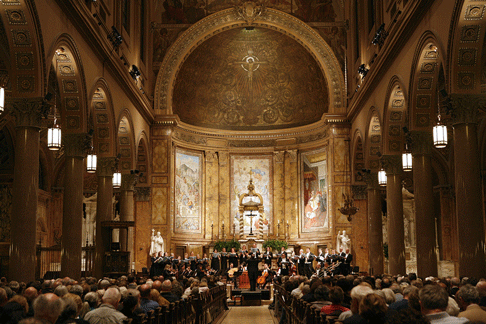16 Oct 2010
Jephtha, New York
Jephtha was Handel’s last work — he went blind while composing it, noting this on the manuscript, and though he lived another seven years, did not deign to dictate new music.

Jephtha was Handel’s last work — he went blind while composing it, noting this on the manuscript, and though he lived another seven years, did not deign to dictate new music.
That’s a pity, because Jephtha’s musical and dramatic structures indicate that a closer intertwining of staged drama and static oratorio was coming into being: Chorales are fewer and less involved in the action than in the earlier oratorios, and the action includes a remarkable quartet of conflicting points of view at a moment of high tension, almost unprecedented in Handelian drama and pointing the way to Mozart and Rossini. Characters state their feelings in da capo arias, as one expects, but alternate such static reveries with soliloquies in recitative accompanied by full orchestra or the occasional duet. The characteristic emotions and tunes we know from Handel are here, but new expressive tools are brought to their aid. After forty years in the business, the great man hadn’t run out of, or even low on, new ideas.
The story, though Biblical, resembles the Idomeneo legend familiar to us from Mozart’s opera (Bible stories could not be staged in England before the twentieth century): Israel’s General Jephtha has vowed, if successful in battle, to sacrifice the first creature he encounters on his return. To his embarrassment, the creature who emerges to welcome him is his daughter. He squirms, he bargains, he considers alternatives — but a vow’s a vow. However, like Neptune (in Idomeneo’s case), Jehovah lets him off the hook: An angel suggests that Iphis, the general’s daughter, be offered to perpetual virginity as a Jewish nun, in effect, and that an animal be sacrificed instead. In the Bible, actually, relentless Jephtha sacrifices his daughter, but Handel’s version recalls the tale of Abraham’s “sacrifice” of Isaac. In any case, the unhappy ending would have had unpleasant political ramifications in Handel’s day, when the rationalists were dwelling on such tales to discredit religion generally. Handel, devout believer and lifelong optimist, pulls it off convincingly, and few among his usual audience today are likely to spot the change. Only Iphis’s boyfriend remains unhappy.
St. Ignatius Loyola, Manhattan’s Jesuit church, is an edifice in the style of a great Roman basilica, with porphyry columns, faux marble panels, frescos of the saint’s life, death and apotheosis and a rather muddy acoustic: A small chorus and orchestra (always preferable for Handel) booms down the long nave to Park Avenue, but individual voices and instruments are not as clear as one might like and soloists seemed to lose their clarity at one end or another of their range. Conductor Kent Tritle’s rhythms were happily vivid, and the three lengthy acts passed swiftly to the exciting conclusion.
 St. Ignatius Loyola
St. Ignatius Loyola
The singers made rather an able than a striking set. Thomas Cooley, in the emotionally awkward title role, sounded too light for the martial persona in the first act but gained strength and bite as the catastrophe of his ineluctable choice came home to him. Charlotte Daw Paulsen has some splendid maternal contralto notes but her voice thinned to a strand above them. Ian Howell, singing Iphis’s boyfriend, a role Handel wrote for a mezzo soprano, is an adept countertenor without the mezzo power or sensuousness one might desire. Kelly Markgraf has a pleasing and agile bass but had very little to do as Jephtha’s brother.
Vocally the occasion would have been professional but little more had not Susanna Phillips sung Iphis, the designated sacrifice, whose arias must present her as a spirited warriors’ cheerleader, a devoted daughter, a fearful suppliant, and a willing martyr by turns. Phillips, who has been garnering lots of attention lately, proved worthy of it: she has an even, flexible voice with a goodly heft to it, shining power in the upper range and no less force and beauty in lower tones. (Handel never wastes part of a voice — he expects his singers to use it all.) Phillips gave a radiant performance, and by the very fact of singing so well throughout her compass disproved any suspicions that St. Ignatius’s acoustics were kinder to certain ranges of sound than others. Her only failing is a certain imprecision in swift ornament — she has, for instance, no trill, and Handel often calls for one. The quality of her soprano is so thrilling and her musicianship so steady that I hope to encounter it often. She will sing Pamina at the Met this winter; she should be adorable in that adorable (and not too ornamental) part.
John Yohalem